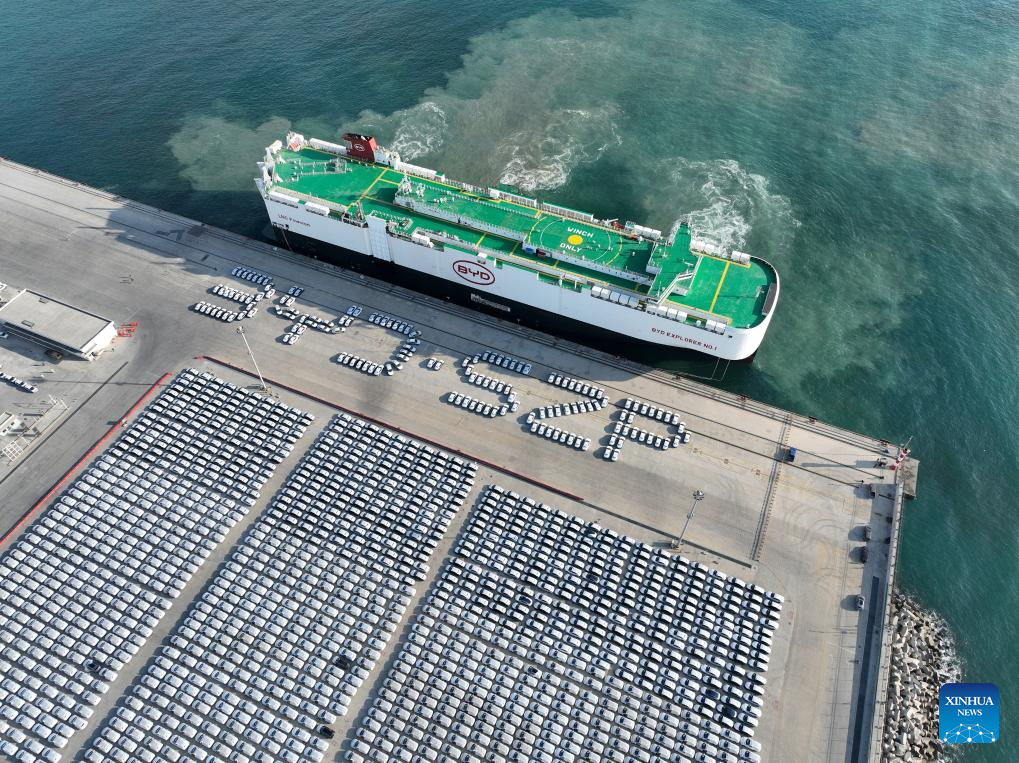BYD, the Chinese automaker, marked a significant expansion with the maiden voyage of its first-ever vessel, “BYD EXPLORER NO.1,” at a port in Shenzhen, Guangdong Province. The vehicle carrier vessel, leased to BYD, carries over 5,000 new energy vehicles (NEVs) and is destined for the ports of Vlissingen in the Netherlands and Bremerhaven in Germany.
The vessel, part of BYD’s growing shipping fleet, was constructed by China International Marine Containers (Group) Co., Ltd. (CIMC) for international ship management company Zodiac Maritime. It represents BYD’s entry into the league of Chinese automakers operating their own shipping fleets to expedite car exports.
China’s General Administration of Customs reported a significant surge in auto exports, reaching 5.22 million vehicles in 2023, reflecting a year-on-year increase of 57.4%. As China’s automobile industry shifts toward increased exports, automakers face challenges such as rising rents, shipping capacity constraints, and fierce competition for available car carriers.
Major Chinese automakers, including BYD, Chery, and SAIC, have responded by establishing their own shipping fleets to navigate these challenges. The move aims to enhance control over logistics and counter the impact of soaring shipping costs.
Global shipping research institution Clarksons Research noted a substantial increase in one-year time charter rates for car carriers from August 2020 to the end of November 2023. The rate for a 6,500 Car Equivalent Unit (CEU) pure car and truck carrier (PCTC) surged from $10,000 per day to $115,000 per day, highlighting the intense competition for shipping capacity.
Guangzhou Shipyard International Company Limited successfully fulfilled an order for two BYD PCTCs in January 2023, contributing to BYD’s growing shipping capabilities. Other automakers, such as Chery and SAIC, are also venturing into establishing their global shipping fleets to address the challenges posed by the dynamic shipping market.
In recent years, the global automobile shipping market has been dominated by automakers in Japan, South Korea, and other countries. However, with the flourishing shipbuilding industry and surging automobile exports, Chinese automakers are increasingly utilizing domestically-built ships for transportation.
Chinese shipyards, including Guangzhou Shipyard International Company Limited, have secured the majority of new orders for car carriers globally. As the trend continues, Chinese shipping fleets are expected to significantly increase their global proportion of car carrier capacity, potentially reaching the fourth position globally.
Industry experts emphasize the strategic significance of establishing shipping fleets for Chinese automakers. Beyond cost competitiveness, these fleets enhance the stability of the supply chain, ensuring timely product delivery to overseas customers.
Xie Xiaowen, an expert with the China Communications and Transportation Association, highlights that acquiring ships symbolizes the continuous development and internationalization of China’s automobile industry. This strategic move not only reduces transportation costs but also ensures the stability of the export business.
Chen Jia, a researcher at Renmin University of China, notes that Chinese automakers’ shipping fleets have the potential to break the longstanding monopoly of foreign shipping companies, laying a solid foundation for their global trajectory. The move underscores the determination of Chinese automakers to navigate challenges, secure their supply chains, and bolster their global competitiveness.
Shayne Heffernan









